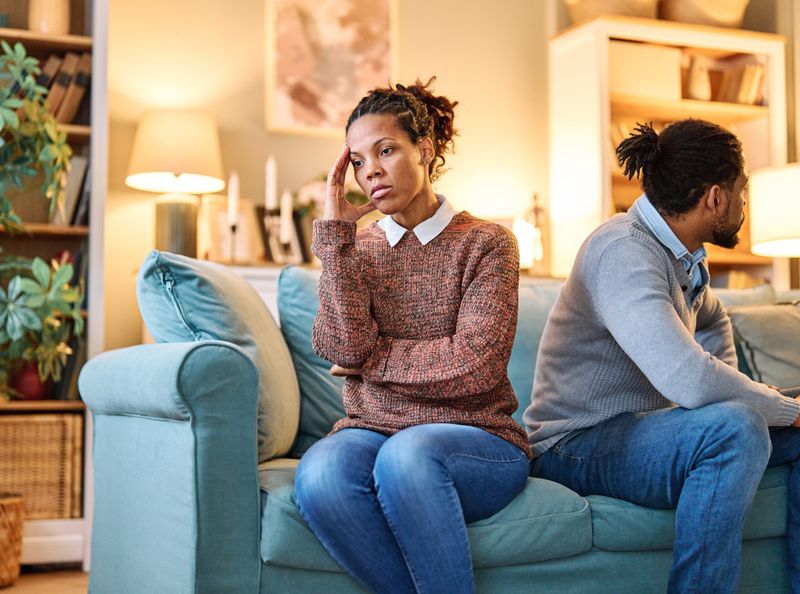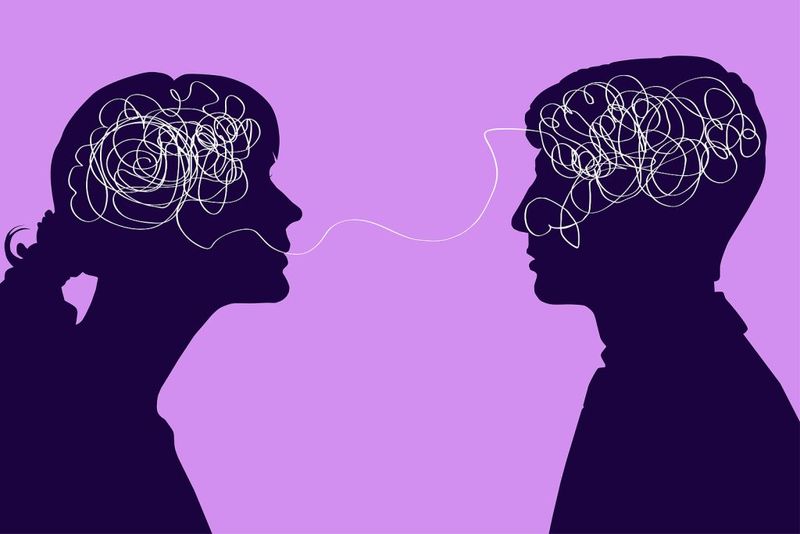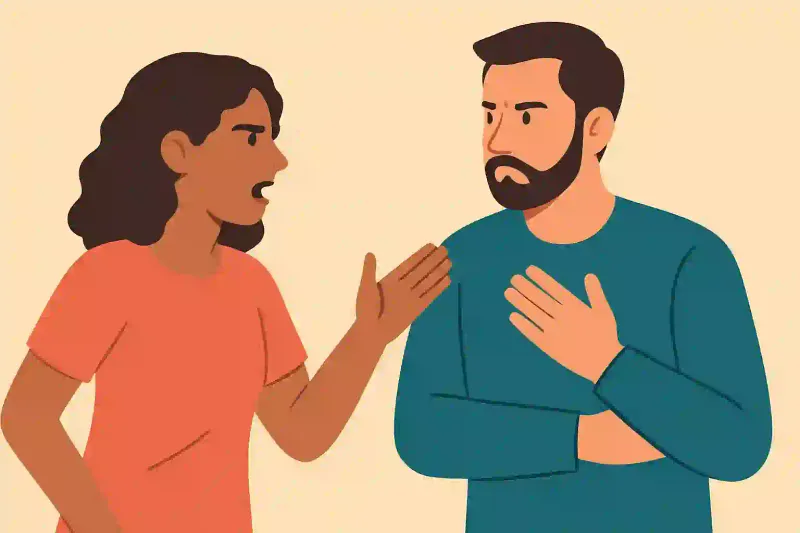13 Ways a Turbulent Marriage Slowly Wears You Down And 5 Smart Moves That Can Turn Things Around
No one walks down the aisle expecting to feel exhausted, unappreciated, or emotionally worn thin. But turbulence in marriage doesn’t always come crashing in. It’s slow. It’s quiet. It’s a gradual unraveling—like tiny paper cuts that don’t bleed, but sting more with every day.
One day you wake up wondering: When did love start feeling like survival? If that hits a little too close to home, here are 13 ways a rocky marriage chips away at your well-being, and 5 intentional, loving strategies that can actually shift the energy back toward hope, connection, and healing.
1. You Walk on Eggshells Around the Person You Love

Ever felt like you have to measure every word because the wrong comment might spark an argument? That’s emotional quicksand, not peace. Even a simple question about dinner can feel like stepping into a minefield.
You start editing yourself, swallowing concerns, and choosing silence just to avoid conflict. It’s exhausting. Suddenly, you’re not even sure what you really think anymore because your thoughts get filtered through the lens of “Will this upset him?”
It isn’t just about avoiding arguments—it’s losing the freedom to be your genuine self at home. That constant tension wears you down, making even happy moments feel temporary and fragile. You never get to exhale all the way. It’s not a partnership; it’s survival mode.
2. You’re Constantly Tired—But It’s Not Just Physical

There’s a special kind of tired that sleep can’t fix. It’s that deep, invisible exhaustion that comes from carrying emotional weight day after day. Your brain never really rests when you’re bracing for tension.
You might chalk it up to being busy, but really, it’s the result of never feeling truly safe or cherished. Even on days with no arguments, you’re on edge—waiting for the next bad mood or cold shoulder.
Over time, your spark dims. Laughter feels forced, and even fun plans take effort. That emotional burnout doesn’t just stay in your head; it settles into your bones. You’re tired in a way that no nap can touch.
3. You Stop Sharing the Small Stuff

Remember when you used to share every weird dream and silly story? Slowly, you stop reaching for your phone to text him about what happened at work. The silence creeps in silently, no drama, just distance.
You tell yourself, “He’s too busy,” or “He won’t care.” One day you realize the little things that made you feel connected are missing. It’s not just about words—it’s losing the thread of everyday intimacy.
The small stuff was never small at all. When you stop sharing, you stop inviting each other into your world. Suddenly, you feel alone even when you’re sitting together. That’s when loneliness becomes a silent roommate.
4. You Feel More Alone Together Than When You’re Actually Alone

There’s a strange kind of loneliness that sneaks in when you’re side-by-side but miles apart emotionally. You can be in the same room, but it’s like a wall of silence has wedged itself between you.
Conversations get replaced with scrolling or passive TV watching. You start to feel invisible, like a ghost in your own home. It’s the opposite of what you thought marriage would be.
Being alone isn’t always about being by yourself. The real ache comes from reaching out and feeling nothing but air. Sometimes, you’d rather be physically alone than sit in that aching togetherness.
5. You Second-Guess Your Emotions Around Them

Gaslighting doesn’t always come with fireworks; sometimes it’s the slow erosion of your confidence. You start thinking, “Maybe I’m just sensitive,” or “It’s probably not a big deal.”
That little voice that used to advocate for you gets quieter. You question your reactions, replay conversations, and wonder if you’re the one making things worse.
It’s not clarity; it’s self-doubt growing roots. When your trust in yourself slips away, everything else starts to feel shaky too. You deserve to believe your own heart, not shrink it to fit someone else’s comfort.
6. Everything Feels Like a Transaction

When did love turn into a meeting agenda? Conversations sound like schedules, and affection feels more like a reward for chores than genuine connection. Suddenly, “Did you pick up the milk?” replaces “How are you feeling?”
Intimacy becomes another item on the to-do list. Hugs feel like checkboxes, not real comfort. Even date nights can start to feel obligatory instead of joyful.
Love isn’t supposed to be keeping score or negotiating chores. Losing the playfulness and spontaneity in exchange for structure leaves you missing the spark that brought you together. It’s exhausting keeping receipts instead of memories.
7. You’re the Emotional Adult for Both of You

Ever notice how you’re always the one smoothing things over, cheering everyone up, or calming storms? Carrying both your emotional baggage and his gets old, fast. There’s a word for it—emotional labor.
You find yourself tiptoeing around moods, monitoring tone, apologizing first, and absorbing every shift in the air. It’s like being the emotional air traffic controller in your own house.
It’s not fair, and it’s definitely not sustainable. You need space to just feel your own feelings without managing someone else’s. You’re a partner, not a one-woman crisis team.
8. You Keep Score Instead of Building Solutions

Grudges have a way of piling up, sneaky as dust bunnies under the couch. Instead of working together, you both keep invisible ledgers—who apologized last, who did the dishes, who forgot the anniversary.
That mental math isn’t just exhausting, it’s toxic. It turns every little disagreement into a battle for fairness, not understanding. The “I did, you didn’t” game only leads to resentment.
When you start tallying up wrongs instead of building solutions, you both lose. Love gets buried under the weight of unfinished business and tiny, unspoken hurts.
9. You Don’t Feel Safe Bringing Up Issues Anymore

Nothing feels heavier than a conversation you’re too scared to have. Maybe it’s the memory of eye-rolls, blame games, or arguments that end in silence. You start quietly shelving your worries, telling yourself it’s not worth the fight.
That doesn’t make problems disappear. It just stacks them up inside you, brick by brick. The silence gets heavier, and the distance grows wider.
You deserve a partner who listens, not a referee who calls fouls. Hiding what hurts only gives it more power, and soon, the courage to speak up feels completely out of reach.
10. You Stop Planning the Future Together

Remember when planning trips, dreaming about a home, or just talking about next year felt exciting? Now it’s like the future is canceled. The words “we” and “us” quietly disappear, replaced by “I” and “me.”
Having joint plans made you feel like teammates, but when that fades, even little goals seem pointless. The dreams you once shared sound like fairy tales from another life.
Losing hope in the future together chips away at your sense of partnership and connection. Planning solo isn’t what you signed up for. You miss dreaming out loud—even if it was just about next weekend.
11. Your Body Tenses When You Hear Their Voice

You know that feeling when someone walks in and your whole body stiffens? That’s not butterflies—that’s survival mode. It’s like your nervous system is on high alert every time you hear your partner’s voice.
It’s not about big fights, either. Even small talk can trigger your body to brace itself, just in case. Your muscles remember the stress, the arguments, and the awkward silences.
Home should be your safest space, not the place you steel yourself against. When your body is always tense, your heart never really gets to relax. That’s no way to live.
12. You Fantasize About Escape—Not Just a Break

Daydreaming about a solo trip used to feel like self-care. Now, it’s a lifeline. You catch yourself picturing an apartment of your own, or entire weekends away—just to breathe.
It’s not about “me time” anymore; it’s about relief from stress that never eases. Plotting escapes in your mind becomes a habit, especially on hard days.
Wishing for freedom instead of togetherness is a loud signal your spirit is running on empty. It’s one thing to crave space, but when you see peace only on the other side of goodbye, something’s got to give.
13. You No Longer Believe Things Will Change

The worst part isn’t even the fights—it’s the slow loss of hope. You stop expecting apologies, affection, or effort. The story in your head turns from “someday it’ll get better” to “maybe it never will.”
That resignation seeps into everything. Even the good days feel like borrowed time. You might not talk about it, but the ache is always there.
Hope is a fragile thing, and when it finally breaks, it takes a piece of you with it. Accepting things as “just the way they are” is a quiet heartbreak all its own.
14. Poor Communication Erodes Everything

Ever tried having a real conversation only to end up more confused than before? That’s the mess poor communication makes. Mixed messages, silent treatments, and raised voices become routine.
Words start to feel dangerous, so you say less or get defensive. Before you know it, every exchange is loaded with tension.
It isn’t just about not talking—it’s about feeling heard, valued, and understood. Without that, misunderstandings pile up and resentment grows like weeds between every word.
15. Financial Stress Steals Your Peace

Money trouble has a way of making even the strongest couples snap. Every bill becomes a battleground, every purchase a potential fight.
You find yourself avoiding certain conversations, worried that one wrong word could spark a blowup. Instead of being a team, it feels like you’re opponents, each protecting different fears.
Financial stress isn’t just numbers. It’s sleepless nights, anxiety, and that gnawing sense of not being secure together. The tension seeps into every part of your relationship, leaving almost nothing untouched.
16. Refusing Help Keeps You Stuck

You know those moments when you hit a wall, but pride or fear keeps you from asking for help? That’s how refusing support can trap you in misery.
Sometimes we convince ourselves we can fix it alone, or that therapy is only for the desperate. But pushing away help just stretches out the pain.
Actually, the bravest thing is reaching for a lifeline. If you’re stuck, it’s not weakness to ask for guidance. It’s the first real step toward choosing something better—for both of you.
17. Start the Conversation From Your Feelings, Not Their Failures

Vulnerability isn’t weakness; it’s magic. Instead of kicking things off with “You always…” try, “I feel…” It drops defenses and opens the door for real connection.
Your feelings are valid, and sharing them gently invites your partner to lean in instead of shut down. You’re not blaming—you’re letting him see the true you beneath the armor.
It’s scary, but honesty breeds empathy. Choosing courage over accusation can completely change the way you talk and heal together.
18. Switch From Blaming to Naming the Pattern

Have you noticed how arguments seem to follow the same tired script? Instead of finger-pointing, call out the cycle. “We get stuck in this loop—how do we change it?”
Pointing out the pattern, not the person, shifts the focus from blame to teamwork. You’re not enemies; you’re both stuck on the same merry-go-round.
When you work together to break the cycle, it’s way less lonely. Suddenly, you’re allies facing the problem side by side, not across a battlefield.







